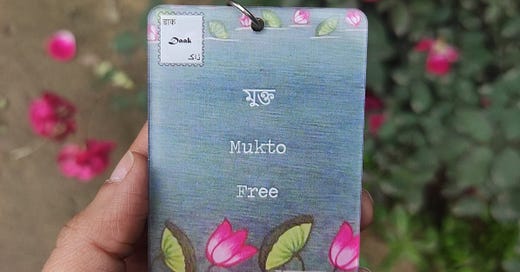This week in Daak:
1. Deprivation and Depravity: Premchand’s Short Story, Kafan
2. Affirmations in Your Pocket
3. Daak Recommends
1. Deprivation and Depravity: Premchand’s Short Story, Kafan
Among Premchand’s last short stories, “Kafan” is a hard-hitting tale which dwells on the depravity that is produced by poverty and deprivation. The main conflict of the story involves a lazy father and son, Ghisu and Madhav respectively, who go out on a quest to find a shroud for Madhav’s wide, Budhia, who has died in labour. After collecting a bit of money, they go to the market but end up spending the money on alcohol and food, eventually passing out in a tavern. The plot, although quite simple, throws up astounding instances of apathy, revealing the extent of dehumanization that can result from an oppressive social order.
Premchand is a masterful observer of human behaviour, offering astute, almost humorous descriptions of the two central characters.
If Ghisu worked for one day, then he rested for three. Madhav was such a slacker that if he worked for an hour, then he smoked his chilam for an hour….If only the two had been ascetics, then they wouldn’t have needed any exercises in self-discipline to achieve contentment and patience. This was their very nature. Theirs was a strange life. Except for two or three clay pots, they had no goods at all in the house. Covering their nakedness with torn rags, free from the cares of the world, laden with debt – they suffered abuse, they suffered blows too, but not grief.
Lest you judge them too harshly, Premchand also humanizes them, offering a glimpse of the extreme impoverishment, which breeds their self-centred attitude.
Pulling out the potatoes, they both began to eat them burning hot. They had eaten nothing since the day before. They were too impatient to wait till the potatoes cooled. Both burned their tongues repeatedly. When the potatoes were peeled, their outer parts didn’t seem so extremely hot. But the moment the teeth bit into them, the inner part burned the tongue and throat and roof of the mouth. Rather than keep that ember in the mouth, it was better to send it quickly along inward, where there was plenty of equipment for cooling it down. So they both swallowed very fast, although the attempt brought tears to their eyes.
In this light, it becomes easier to understand that for Ghisu and Madhav, this attitude is a way to escape the exploitative social system in which they can never win.
A society in which those who laboured night and day were not in much better shape than these two; a society in which compared to the peasants, those who knew how to exploit the peasants’ weaknesses were much better off – in such a society, the birth of this kind of mentality was no cause for surprise.
As the two make their way through the market rejecting perfectly suitable shrouds, a silent complicity brings them to a tavern, and they begin to indulge in alcohol and food they can only dream of. As their intoxication rises, they express a complex mixture of regret, fondness for Budhia and moral justification for their own behaviour.
“What a bad custom it is that someone who didn’t even get a rag to cover her body when she was alive, needs a new shroud when she’s dead.”
“After all, the shroud burns along with the body.”
“What else is it good for? If we’d had these five rupees earlier, we would have given her some medicine.”
//
Ghisu laughed. “We’ll say the money slipped out of my waistband – we searched and searched for it, but it didn’t turn up. [People won’t believe it, but they’ll still give the same sum again.]”
Madhav too laughed at this unexpected good fortune, at defeating destiny in this way. He said, “She was very good, the poor thing. Even as she died, she gave us a fine meal.”
//
Both then sat eating puris, with all the majesty of a tiger in the jungle pursuing his prey. They had no fear of being called to account, nor any concern about disgrace. They had passed through these stages of weakness long ago. Ghisu said in a philosophical manner, “If my soul is being pleased, then won’t she receive religious merit?”
In a final act of irony, Madhav, unable to finish the excessive amount of food, hands the leftovers to a beggar, feeling a great sense of pride in his own generosity.
Translation by Frances W. Pritchett
Read the full story, “Kafan” in English here and in the original Hindi here.
2. Affirmations in your Pocket
Our keychains with powerful words of affirmations are the perfect talismans to carry around in your pocket, reminding you to live your truth.
3. Daak Recommends
Also, read another Daak on Premchand’s heartwarming story, “Bade Bhai Sahab” and a review of Satyajit Ray’s film adaptation of “Shatranj Ke Khiladi”.




Loved this. Premchand was a master story teller.
Great story ❤️